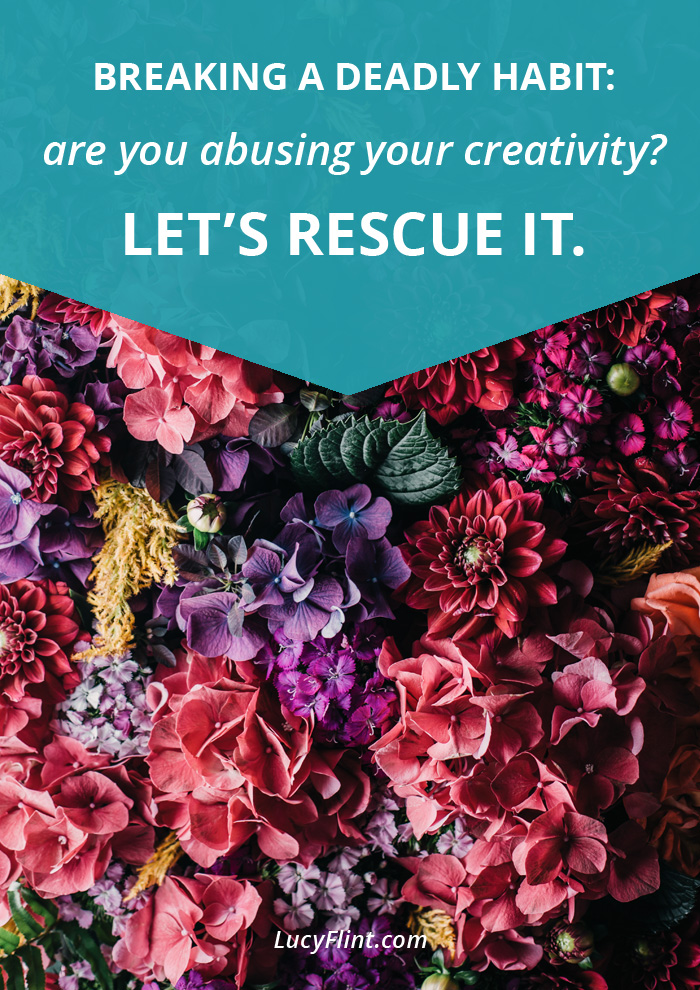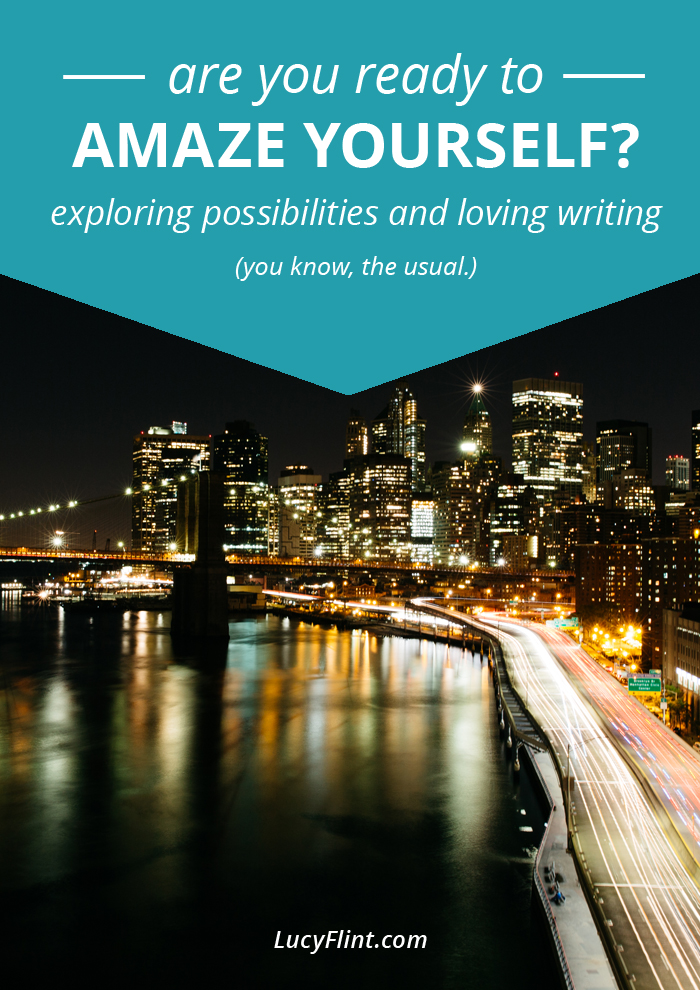Breaking a Deadly Habit: Are You Abusing Your Creativity? Let's Rescue It.
/As writers, one of our most vital resources, our most prized possessions, is our creativity.
That's a fair thing to say, right? If there's no creativity, there are no words on the page, no stories brewing in the mind, no plots, no outlines, no characters.
Creativity is a tool, a source. It's the thing we use constantly in our lives and our work.
Given that, we should be as invested in protecting it and caring for it as we are our other important tools—our computers and software, the copyrights for our work, our access to books.
Right?
But it's so easy to forget to see it that way.
It's easy for me to make sure my fancy computer is well taken care of, but creativity, well, it's there when I need it, right?
We can get kind of blasé about our creativity. Careless. We can take it for granted. Leave it out in the rain, let it pick up a few dings, stop putting it in its protective case.
You tracking with me?
Not that I want to get too precious about this, but I want to be a better protector and champion of my own creativity.
I want to treat it like it's the thing that's bringing home the bacon. The central engine for everything I'm trying to run.
I want to take better care of my creativity.
One thing that kinda shook me up with The Artists's Way was how Julia Cameron kept calling it a course in creative recovery.
I feebly tried to fend this off a little, when I picked the book up in the spring. "My creativity is basically fine, I'm just looking for a little pick-me-up, it's not like I'm in trouble here or anything..."
( ... Whoops, sorry, I snort a little when I laugh sometimes.)
Ahem.
The more I read, the more I realized I'd been so casual about creativity. So narrow-minded in how I think of it. And so dismissive about the possibilities and the power of creativity, that I'd been kind of strangling mine.
Not that it was dead, but it was definitely a bit winded and it didn't want to sit too close to me.
And since I want to take everything I've learned and plunge oh so deep into writing my trilogy this fall, I don't want to alienate creativity.
Instead, I want to put a huge welcome mat by my desk. I want to hand it a hot drink and give it the comfiest seat in the house.
Creativity!! It is so good to see you. Please come in. Please make yourself at home. What can I do to make you comfortable and happy?
... How about you? How are you and creativity doing these days? Are you on speaking terms? Best friends? Or avoiding each other's eyes?
The books that I've been studying have a bit to say about ways that we thwart our own creativity. So if you, like me, want to get super imaginative in the upcoming weeks, you'll want to keep reading.
We've been feeding cyanide to our creativity.
Just a little warning: None of us are going to like what's ahead here.
Because if we know how important our creativity is, and how beautiful it can be, it's going to be a real bummer to realize that most of us have been slipping cyanide into its food.
And maybe even kicking it a little, as it writhes on the floor.
How are we doing this?
Through comparison. Competition. Measuring our work against someone else's, and focusing on the differences we see.
This will literally shut down creativity.
It changes everything.
Think back to times when you've done this. Can you kind of feel, in slow-motion, how those comparison-driven thoughts flooded your ability to create with poison?
I don't know how it looks for you, but this is how it goes down for me:
When a classmate of mine got an interview with a big-name author I admire, and when I found out that she'd published quite a few books as well, I didn't think, "Marvelous! Good for her! And I'm going to my desk right now!"
I didn't.
Instead I felt like my lungs had filled up with poison gas, and my arms and legs felt hot and slow and my mind was yelling at me that I'm so stupid, and I've lost all my chances, and everyone's given up on me by now, and what the heck have I been doing with my time?
I looked at my novel and thought, "Pfft! Books for kids! I'm just writing silly stuff and I can't even do that very well!"
I dismissed everything I've worked for and everything I've become with one contemptuous shrug of the shoulders.
(Plus I was LYING to myself in a huge way and pretended it was the whole truth. Not a helpful move.)
My work-in-progress didn't really thrive that day.
Neither did its writer.
... I know I'm not alone here.
This is such an easy thing to fall into, and I'd love to take a lot of time to talk about how our culture encourages this, how crappy teachers and vile schoolmates do it to us, how misguided "encouragers" can point out where we should be more like so-and-so...
But no matter how we got here, the point is: when we let comparison and competition into our writing lives, it cackles a bit and then strolls over to murder our creativity.
And frankly, my friends, that's not great. Nor is it a useful long-term writing strategy.
I love how Julia Cameron says this—it's just so helpful to me:
When we focus on competition, we poison our own well, impede our own progress. When we are ogling the accomplishments of others, we take our eye away from our own through line. We ask ourselves the wrong questions, and those wrong questions give us the wrong answers.
I LOVE that. She's so right: it switches our attention.
I so wish I could time travel back to when I found out about my classmate. I wish I could have just taken a huge breath, said "Good for her," out loud, and then put the information aside.
And then I wish I would have surrounded myself with my beautiful characters, my incredible storyworld, and the next hilarious scene.
Instead of asking, "Why can't that be me?!" I wish I would have gently and compassionately asked, "What is the best thing I can do for my story today? What is the next exciting thing to write?"
THAT is what I wish I had done.
Instead of wallowing in hateful comparison, I wish I had just thrown my arms around creativity.
Cameron goes on to say,
The desire to be better than can choke off the simple desire to be. As artists we cannot afford this thinking. It leads us away from our own voices and choices and into a defensive game that centers outside of ourselves and our sphere of influence. It asks us to define our own creativity in terms of someone else's.
Gaa! Doesn't that last line just get you?!
Comparison isn't our friend. It's not on our side.
Creativity is.
In The Gifts of Imperfection, Brené Brown talks about how comparison is the thing we need to let go of, if we're going to cultivate creativity. She says,
Comparison is all about conformity and competition. ... The comparison mandate becomes this crushing paradox of "fit in and stand out!" ...
Letting go of comparison is not a to-do list item. For most of us, it's something that requires constant awareness. It's so easy to take our eyes of our path to check out what others are doing and if they're ahead or behind us.
She goes on to say,
If we want to make meaning, we need to make art. ... Creativity, which is the expression of our originality, helps us stay mindful that what we bring to the world is completely original and cannot be compared.
If you're struggling with this whole comparison thing like I am, please do this for yourself: Write down that last bit and stick it to your computer, your mirror, your forehead.
Remind yourself of it often!
What you bring to the world—your story, your writing style, your characters, your take on the genre, your setting—it's COMPLETELY ORIGINAL.
It cannot be compared.
If we're going to move forward as writers, if we're going to keep growing in our work, then we have to put to death this habit of comparing.
Comparing ourselves to peers, to the people who are writing in a similar genre or sphere.
Comparing ourselves to established masters of the craft.
Comparing ourselves to people who seem to be doing "worse" than we are.
Comparing ourselves to unattainable perfection.
We've gotta stop doing it, my friends.
How to embrace a radically new perspective on creativity.
One way to help loosen our grip on comparison is to have an even clearer sense of our own creativity.
Julia Cameron uses one metaphor for creativity over and over, and honestly, at first, I thought it was a bit hokey.
And then, the longer I sat with it, the more I realized she was totally right.
(This is true for about 99% of my experience with the book, by the way. I'd react with, "Gaa! That's so silly." Pause. "Well, she might have a point." Pause. "Oh gosh, actually, that's dead right." And the book would just grin up at me.)
Cameron talks about creativity, about our inner artist, as a child.
(I know, I know. Just go with it for a bit.)
If you've been around kids for ten minutes, you've seen how explosively, endlessly creative they can be.
So, what's the best way to grow your creativity? Cameron says, throughout her book, that the way to grow it is by nurturing it—just as you would nurture a child.
Give it a sense of safety. Protect it from unkind influences (like the nasty lies that rear up in our minds). Provide it with fun things that it wants to play with.
Do not abuse it with harsh words, the silent treatment, lies, or starvation.
She says,
We must actively, consciously, consistently, and creatively nurture our artist selves. ... Only when we are being joyfully creative can we release the obsession with others and how they are doing.
Can you practice treating your creativity like it's a child that you dearly love? Can you practice giving it room to play? Handing it every fun tool or toy that it wants?
Can you let it make a mess?
Can you talk to it with compassion, gentleness, as if it were someone you loved?
One of the best ways to do this is through a core principle in The Artist's Way: the artist date.
From the start of the book, Cameron asks that we make a commitment to a weekly artist date.
What does that mean?
She says,
An artist date is a block of time, perhaps two hours weekly, especially set aside and committed to nurturing your creative consciousness, your inner artist. ... The artist date is an excursion, a play date that you preplan and defend against all interlopers.
YES.
I just love this concept. And the rare times (I mentioned the summer was crazy, right?) that I was able to do this, I felt so much better.
More connected to my imagination, to a wider sense of the world, to my ability as a creator.
The amazing thing is, an artist date can be so simple. An outing to a beloved art store, or a nearby quirky furniture/home store are two favorites. Or sometimes I block off the time to sit and paint with watercolors.
I'll be the first to say: I'm not great at doing this yet. It's an area where I really have to practice defending my time (from others and from myself!).
And it's hard to let myself have fun. (Honestly, if there was a rehab center for learning to play and have fun, I'd probably have to check myself in. So, if this doesn't come easily to you—solidarity, my friend.)
I really believe that these artist dates—time set aside for pure nurturing—are truly worth it.
So here's my crazy suggestion: Can you, can I, can all of us give ourselves permission to take an artist date this week?
To block out time and go on an outing? Or to pull out some dusty hobby that we love but feel sheepish about, and pursue it for a while?
Can we essentially hand our inner artist a huge ice cream cone and say, "Go to town, kiddo! Today we're just going to have fun together!"
Maybe this means buying yourself balloons or maybe it means going on a long walk by a lake.
Maybe it means buying the huge pack of fifty markers from the back-to-school display and a coloring book or four.
Or maybe you grab a bunch of sidewalk chalk, and let loose on your patio.
Maybe it means getting messy, or maybe it means wandering in a new place.
If you're stuck for ideas, try these quick prompts:
What are twenty things that you love doing?
What hobbies did you love as a kid?
What were your favorite toys as a kid? What did you just love playing with? Where did you most love to go?
What did you love to do in art class? Music class?
Where do you like to explore?
What kinds of activities or places seem to release something good in you?
Remember, you are not allowed to label your artist date as something "silly." (That's comparison sneaking in again, and remember that it just wants to slit creativity's throat. Don't let it.)
Aim for delight. Play. Fun. Joy.
Even if you're not good at it, like me, practice anyway.
Even if you get caught up in questions like, "am I doing this right?" ... practice anyway.
Why? Because it's worth it.
As Cameron says,
Serious art is born from serious play.
Let's make our creativity feel welcomed, supported, nurtured, and loved.
And let's take our artist date this week.

















